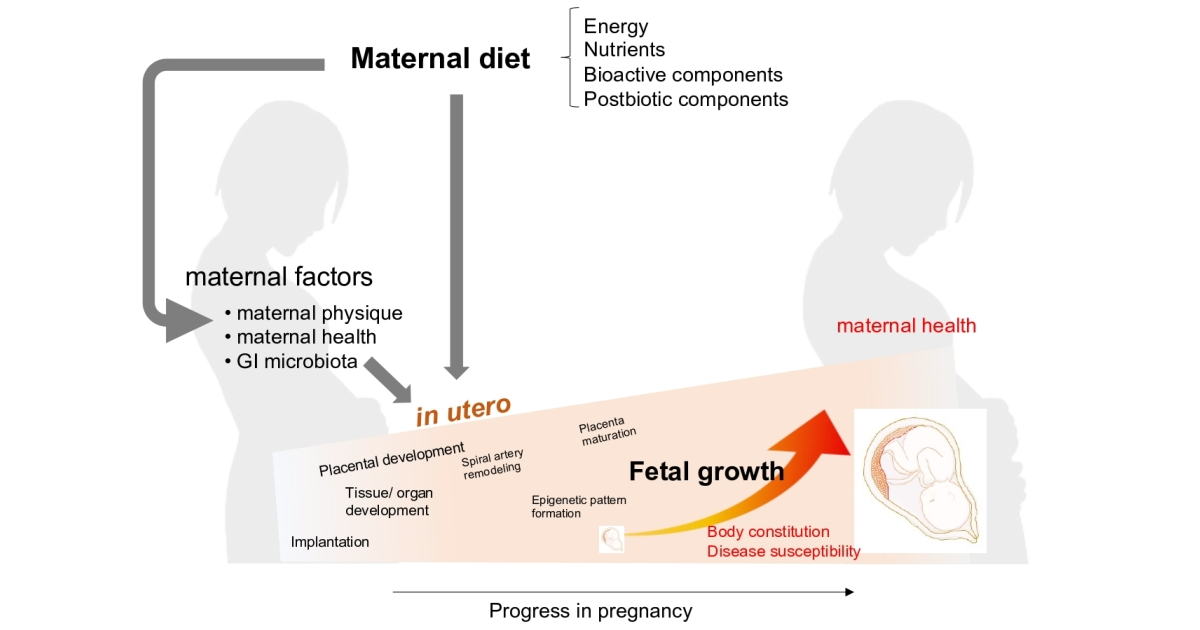The Effects of Nutritional Intake during Pregnancy on Maternal and Offspring Health
A special issue of Nutrients (ISSN 2072-6643). This special issue belongs to the section "Nutrition and Public Health".
Deadline for manuscript submissions: closed (15 May 2024) | Viewed by 1730

Special Issue Editors
Interests: developmental origin of health and disease; fetal growth; placental growth; noncommunicable disease; genetic risks; epigenetics; nutrient profile; nutrition and health science
Interests: life science; obstetrics and gynecology; gestational diabetes; preterm birth; genome/epigenome; ultrasound; pregnancy after radical trachelectomy/conization; DOHaD
Special Issue Information
Dear Colleagues,
During pregnancy, the mother’s physiological adaptations and changes in nutritional requirements are necessary to accommodate placental formation and intense fetal growth. Inadequate maternal intake of macronutrients, micronutrients, and dietary fibers and/or excessive intake of energy may increase the risk of pregnancy complications and subsequent development of noncommunicable diseases for both mother and offspring. In fetal growth, appropriate weight gain, as well as the normal functional development of the brain, metabolic organs, and other tissues, is crucial. Recently, it has been shown that metabolites derived from maternal gastrointestinal microbiota play a vital role in fetal development through the regulation of immunity and metabolism. In other words, diet has an important influence not only as a nutritional element for the formation of the placenta and fetus but also in maintaining the preferable compositions of the gastrointestinal microbiota. A comprehensive understanding of the importance of diet during pregnancy and proper assessment of diet quality and quantity is necessary to promote maternal and offspring health.
This Special Issue aims to update our knowledge on this topic and to inform practice. We invite all researchers, scholars, dieticians, nutrition specialists, and clinicians involved in this field to submit original research articles, clinical studies, and review articles to this Special Issue.
Prof. Dr. Noriko Sato
Dr. Yoshifumi Kasuga
Guest Editors
Manuscript Submission Information
Manuscripts should be submitted online at www.mdpi.com by registering and logging in to this website. Once you are registered, click here to go to the submission form. Manuscripts can be submitted until the deadline. All submissions that pass pre-check are peer-reviewed. Accepted papers will be published continuously in the journal (as soon as accepted) and will be listed together on the special issue website. Research articles, review articles as well as short communications are invited. For planned papers, a title and short abstract (about 100 words) can be sent to the Editorial Office for announcement on this website.
Submitted manuscripts should not have been published previously, nor be under consideration for publication elsewhere (except conference proceedings papers). All manuscripts are thoroughly refereed through a single-blind peer-review process. A guide for authors and other relevant information for submission of manuscripts is available on the Instructions for Authors page. Nutrients is an international peer-reviewed open access semimonthly journal published by MDPI.
Please visit the Instructions for Authors page before submitting a manuscript. The Article Processing Charge (APC) for publication in this open access journal is 2900 CHF (Swiss Francs). Submitted papers should be well formatted and use good English. Authors may use MDPI's English editing service prior to publication or during author revisions.
Keywords
- developmental origin of health and disease (DOHaD)
- placental programming
- fetal growth
- gestational weight gain
- gestational diabetes
- maternal diet
- microbiome and microbiota
- infant development






